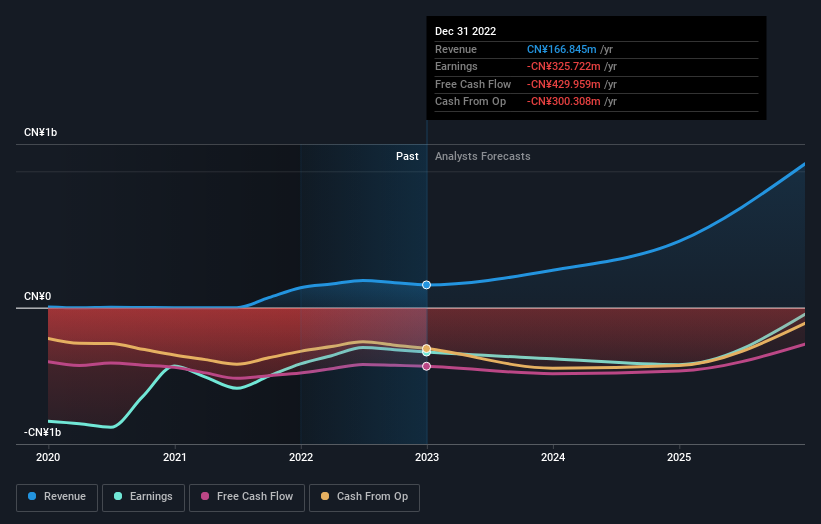Alphamab Oncology's (HKG:9966) largest shareholder, CEO Ting Xu sees holdings value fall by 6.9% following recent drop
Key Insights
- Insiders appear to have a vested interest in Alphamab Oncology's growth, as seen by their sizeable ownership
- 51% of the business is held by the top 3 shareholders
- Using data from analyst forecasts alongside ownership research, one can better assess the future performance of a company
Every investor in Alphamab Oncology (HKG:9966) should be aware of the most powerful shareholder groups. We can see that individual insiders own the lion's share in the company with 51% ownership. In other words, the group stands to gain the most (or lose the most) from their investment into the company.
And last week, insiders endured the biggest losses as the stock fell by 6.9%.
Let's take a closer look to see what the different types of shareholders can tell us about Alphamab Oncology.
View our latest analysis for Alphamab Oncology

What Does The Institutional Ownership Tell Us About Alphamab Oncology?
Institutions typically measure themselves against a benchmark when reporting to their own investors, so they often become more enthusiastic about a stock once it's included in a major index. We would expect most companies to have some institutions on the register, especially if they are growing.
We can see that Alphamab Oncology does have institutional investors; and they hold a good portion of the company's stock. This suggests some credibility amongst professional investors. But we can't rely on that fact alone since institutions make bad investments sometimes, just like everyone does. It is not uncommon to see a big share price drop if two large institutional investors try to sell out of a stock at the same time. So it is worth checking the past earnings trajectory of Alphamab Oncology, (below). Of course, keep in mind that there are other factors to consider, too.

Hedge funds don't have many shares in Alphamab Oncology. With a 33% stake, CEO Ting Xu is the largest shareholder. The second and third largest shareholders are Chuanxiao Xue and Xitian Zhang, with an equal amount of shares to their name at 8.9%.
After doing some more digging, we found that the top 3 shareholders collectively control more than half of the company's shares, implying that they have considerable power to influence the company's decisions.
While it makes sense to study institutional ownership data for a company, it also makes sense to study analyst sentiments to know which way the wind is blowing. There are plenty of analysts covering the stock, so it might be worth seeing what they are forecasting, too.
Insider Ownership Of Alphamab Oncology
The definition of an insider can differ slightly between different countries, but members of the board of directors always count. Company management run the business, but the CEO will answer to the board, even if he or she is a member of it.
Most consider insider ownership a positive because it can indicate the board is well aligned with other shareholders. However, on some occasions too much power is concentrated within this group.
It seems that insiders own more than half the Alphamab Oncology stock. This gives them a lot of power. Insiders own HK$4.2b worth of shares in the HK$8.3b company. That's extraordinary! It is good to see this level of investment. You can check here to see if those insiders have been selling any of their shares.
General Public Ownership
The general public, who are usually individual investors, hold a 38% stake in Alphamab Oncology. While this group can't necessarily call the shots, it can certainly have a real influence on how the company is run.
Private Company Ownership
Our data indicates that Private Companies hold 4.8%, of the company's shares. Private companies may be related parties. Sometimes insiders have an interest in a public company through a holding in a private company, rather than in their own capacity as an individual. While it's hard to draw any broad stroke conclusions, it is worth noting as an area for further research.
Next Steps:
I find it very interesting to look at who exactly owns a company. But to truly gain insight, we need to consider other information, too. For example, we've discovered 3 warning signs for Alphamab Oncology that you should be aware of before investing here.
If you would prefer discover what analysts are predicting in terms of future growth, do not miss this free report on analyst forecasts.
NB: Figures in this article are calculated using data from the last twelve months, which refer to the 12-month period ending on the last date of the month the financial statement is dated. This may not be consistent with full year annual report figures.
Have feedback on this article? Concerned about the content? Get in touch with us directly. Alternatively, email editorial-team (at) simplywallst.com.
This article by Simply Wall St is general in nature. We provide commentary based on historical data and analyst forecasts only using an unbiased methodology and our articles are not intended to be financial advice. It does not constitute a recommendation to buy or sell any stock, and does not take account of your objectives, or your financial situation. We aim to bring you long-term focused analysis driven by fundamental data. Note that our analysis may not factor in the latest price-sensitive company announcements or qualitative material. Simply Wall St has no position in any stocks mentioned.
① During the campaign period, US stocks, US stocks short selling, US stock options, Hong Kong stocks, and A-shares trading will maintain at $0 commission, and no subscription/redemption fees for mutual fund transactions. $0 fee offer has a time limit, until further notice. For more information, please visit: https://www.webull.hk/pricing
Webull Securities Limited is licensed with the Securities and Futures Commission of Hong Kong (CE No. BNG700) for carrying out Type 1 License for Dealing in Securities, Type 2 License for Dealing in Futures Contracts and Type 4 License for Advising on Securities.

English